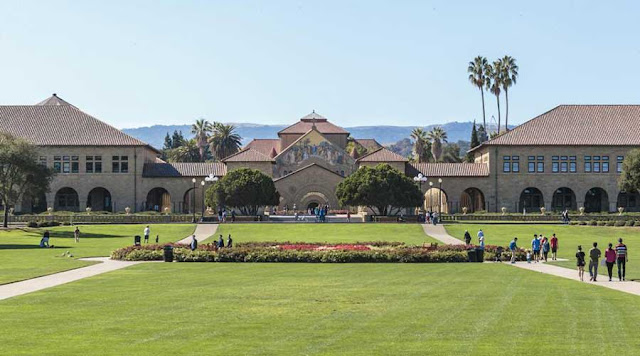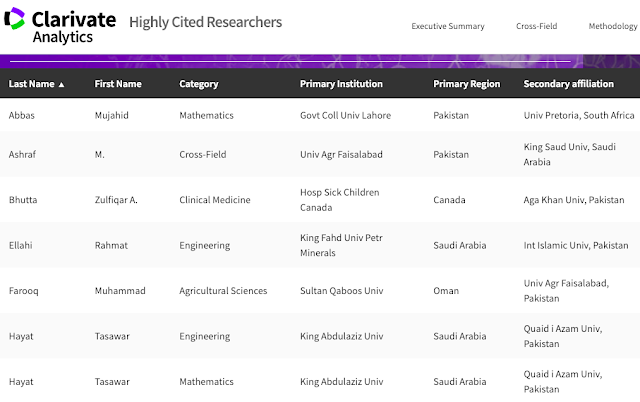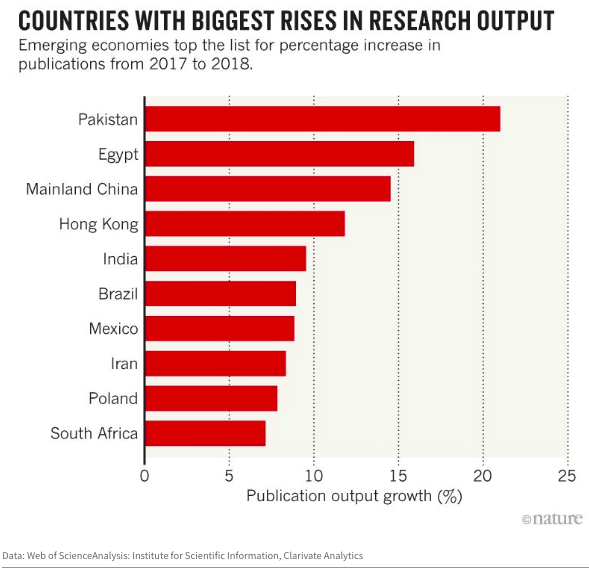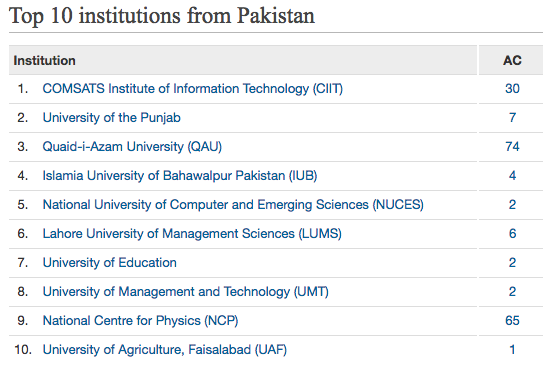PakAlumni Worldwide: The Global Social Network
The Global Social Network
Stanford Ranks 243 Pakistani Scientists Among World's Top 2%
Stanford University has ranked 243 Pakistani scientists among the world's top 2% scientists for 2019. Among them are 81 Pakistani professors who are recognized in the lifetime research work list of 160,000 scientists.
 |
| Stanford University |
Stanford's Top 2% Scientists List:
Stanford University has ranked 243 Pakistani scientists among the world's top 2% scientists for 2019. Among them are 81 Pakistani professors who are recognized in the lifetime research work list of 160,000 scientists. The list of the top 2% of the world's scientists has been created by experts from Stanford University based on data from Elsevier’s Scopus, the abstract and citation database. It covers 22 scientific fields and 176 subfields and provides standardized information on citations, h-index, co-authorship-adjusted hm-index, citations to papers in different authorship positions, and a composite indicator.
 |
| Pakistani Professors on Stanford List |
Highly Cited Researchers (HCR):
Last year, Clarivate Analytics listed 6 Pakistani and 10 Indian researchers in its list of the world's 4000 most highly cited researchers (HCR). It included 12 Iranians and no Bangladeshis and no Sri Lankans. This Highly Cited Researchers list included 17 Nobel Laureates. It represented more than 60 nations, but more than 80% of them were from the 10 nations and 70% from the first five – a remarkable concentration of top talent. Here are the top 10 nations in order: United States, United Kingdom, China, Germany, Australia, Netherlands, Canada, France, Switzerland and Spain.
 |
| Most Highly Cited Pakistani Scientists. Source: Clarivate Analytics |
The United States led among HCRs with 2,639 scientists followed by the United Kingdom's 546 and China's 482. Top three institutions producing world's most highly cited researchers were: Harvard University (186), National Institutes of Health (148) and Stanford University (100). Chinese Academy of Sciences ranks 4th with 99 highly cited researchers.
 |
| CRISPR-related papers published in 2018. Source: Science Magazine |
Research Output Growth:
Pakistan is one of the world's top two countries where the research output rose the fastest in 2018, according to Nature Magazine. The publication reports that the "global production of scientific papers hit an all-time high this year...with emerging economies rising fastest".
 |
| Countries With Biggest Rises in Research Output. Source: Nature |
Pakistan ranked first or second depending on whether one accepts the text or the graphic (above) published by Nature. The text says Egypt had 21% growth while the graph shows Pakistan with 21% growth. Here's an excerpt of the text: "Emerging economies showed some of the largest increases in research output in 2018, according to estimates from the publishing-services company Clarivate Analytics. Egypt and Pakistan topped the list in percentage terms, with rises of 21% and 15.9%, respectively. ...China’s publications rose by about 15%, and India, Brazil, Mexico and Iran all saw their output grow by more than 8% compared with 2017".
Scientific Output:
Pakistan's quality-adjusted scientific output (Weighted Functional Count) as reported in Nature Index has doubled from 18.03 in 2013 to 37.28 in 2017. Pakistan's global ranking has improved from 53 in 2013 to 40 in 2017. In the same period, India's WFC has increased from 850.97 in 2013 to 935.44 in 2017. India's global ranking has improved from 13 in 2013 to 11 in 2017.
 |
| Top 10 Pakistan Institutions in Scientific Output. Source: Nature I... |
Pakistan's Global Ranking:
Pakistan ranks 40 among 161 countries for quality adjusted scientific output for year 2017 as reported by Nature Index 2018. Pakistan ranks 40 with quality-adjusted scientific output of 37.28. India ranks 11 with 935. Malaysia ranks 61 with 6.73 and Indonesia ranks 63 with 6.41. Bangladesh ranks 100 with 0.81. Sri Lanka ranks 84 with 1.36. US leads with almost 15,800, followed by China's 7,500, Germany 3,800, UK 3,100 and Japan 2,700.
Nature Index:
The Nature Index is a database of author affiliation information collated from research articles published in an independently selected group of 82 high-quality science journals. The database is compiled by Nature Research. The Nature Index provides a close to real-time proxy of high-quality research output and collaboration at the institutional, national and regional level.
The Nature Index includes primary research articles published in a group of high-quality science journals. The journals included in the Nature Index are selected by a panel of active scientists, independently of Nature Research. The selection process reflects researchers’ perceptions of journal quality, rather than using quantitative measures such as Impact Factor. It is intended that the list of journals amounts to a reasonably consensual upper echelon of journals in the natural sciences and includes both multidisciplinary journals and some of the most highly selective journals within the main disciplines of the natural sciences. The journals included in the Nature Index represent less than 1% of the journals covering natural sciences in the Web of Science (Clarivate Analytics) but account for close to 30% of total citations to natural science journals.
Pakistan vs BRICS:
In a report titled "Pakistan: Another BRIC in the Wall", author Lulian Herciu says that Pakistan’s scientific productivity has quadrupled, from approximately 2,000 articles per year in 2006 to more than 9,000 articles in 2015. During this time, the number of Highly Cited Papers featuring Pakistan-based authors increased tenfold, from 9 articles in 2006 to 98 in 2015.
Top Asian Universities:
In terms of the number of universities ranking in Asia's top 500, Pakistan with its 23 universities ranks second in South Asia and 7th among 17 Asian nations topped by China with 112, Japan 89, India 75, South Korea 57, Taiwan 36, Malaysia 26, Pakistan 23, Indonesia 22, Thailand 19, Philippines 8, Hong Kong 7, Vietnam 7, Bangladesh 6, Sri Lanka 4, Singapore 3, Macao 2 and Brunei 2.
Summary:
Stanford University has ranked 243 Pakistani scientists among the world's top 2% scientists for 2019. Among them are 81 Pakistani professors who are recognized in the lifetime research work list of 160,000 scientists. Last year Clarivate Analytics listed 6 Pakistani and 10 Indian researchers in its list of the world's 4000 most highly cited researchers (HCR). There were 12 Iranians and no Bangladeshis and no Sri Lankans on it. Pakistan is among the world's top two countries where the research output rose the fastest in 2018. Pakistan's quality-adjusted scientific output (WFC) as reported in Nature Index has doubled from 18.03 in 2013 to 37.28 in 2017. Pakistan's global ranking has improved from 53 in 2013 to 40 in 2017. Pakistan ranks 40 with quality-adjusted scientific output of 37.28. India ranks 11 with 935. Malaysia ranks 61 with 6.73 and Indonesia ranks 63 with 6.41. Bangladesh ranks 100 with 0.81. Sri Lanka ranks 84 with 1.36. In a report titled "Pakistan: Another BRIC in the Wall", author Lulian Herciu says that Pakistan’s scientific productivity has quadrupled, from approximately 2,000 articles per year in 2006 to more than 9,000 articles in 2015. During this time, the number of Highly Cited Papers featuring Pakistan-based authors increased tenfold, from 9 articles in 2006 to 98 in 2015. British ranking agency Quacquarelli Symonds (QS) has recently ranked 23 Pakistani universities among the top 500 Asian universities for 2019, up from 16 in 2018.
Related Links:
Haq's Musings
South Asia Investor Review
Pakistani-American is Top US Expert in Quantum Computing
AI Research at NED University Funded By Silicon Valley NEDians
Pakistan Hi-Tech Exports Exceed A Billion US Dollars in 2018
Pakistan Becomes CERN Member
Pakistani Scientists at CERN
Rising College Enrollment in Pakistan
Pakistani Universities Listed Among Asia's Top 500 Jump From 16 to ...
Genomics and Biotech Research in Pakistan
Human Capital Growth in Pakistan
Educational Attainment in Pakistan
Pakistan Human Development in Musharraf Years
-
Comment by ZAHRA ZAFAR on November 24, 2020 at 8:54pm
-
Stanford University has ranked 243 Pakistani scientists among the world's top 2% scientists for 2019. Among them are 81 Pakistani professors who are recognized in the lifetime research work list of 160,000 scientists.
-
Comment by Mohammad Nusrat Saeed on November 25, 2020 at 6:38am
-
Any History of Research papers published by Pakistani Researchers from 1947 to date?
It is heartening to see such developments any way. It may not be recorded but hundreds of papers must been written by our Nuclear Faculty and practicing Engineers and scientists. from 1963 to date when our Nuclear Engineering and PAEC started to work under Dr. I. H. Usmani the pioneer.
Can some one organize his data?
-
Comment by Riaz Haq on May 22, 2022 at 7:19am
-
#Karachi's Aga Khan University Prof Zulfiqar Bhutta ranked among top 100 scientists in #medicine globally. He is the only scientist from #Pakistan and the low- and middle-income countries who made it to the top 100. #Pediatrics #AKU @AKUGlobal @PFL_aku https://www.thenews.com.pk/print/959688-prof-zulfiqar-bhutta-ranked...
Professor Zulfiqar Bhutta of the Aga Khan University (AKU) has been ranked among the top 100 medicine scientists in the first edition of top scientists ranking for medicine published by Research.com, one of the major knowledge centres for medicine research
The ranking is based on criteria that consider h-index, which indicates how productive and influential a researcher is, as well as publications and citations.
The ranking team examined 166,880 scientists on Google Scholar and Microsoft Academic Graph, and over 65,743 profiles for the discipline of medicine.
Professor Bhutta is the only scientist from Pakistan and the low- and middle-income countries who made it to the top 100.
“As is the case for other recent recognitions, though a personal recognition, this ranking reflects the achievements of scores of young researchers and faculty members across the world who have worked with me on problems of the most marginalised and impoverished women and children in poor communities,” commented Professor Bhutta, who is the founding director of the Centre of Excellence in Women and Child Health and the Institute for Global Health and Development at AKU, and co-director of the SickKids Centre for Global Child Health, Robert Harding Chair in Global Child Health and Policy, and a senior scientist in the Child Health Evaluative Sciences programme at The Hospital for Sick Children, Toronto.
“Congratulations to Professor Bhutta and his team for this great achievement. Their relevant research at the AKU has changed lives not only in the countries where we seek to serve but also globally,” said AKU President Sulaiman Shahabuddin.
Professor Bhutta is one of the original members of the AKU’s faculty since the establishment of the university.
Having begun his career at AKU in 1986, the university provided a foundation for the development of an illustrious career in which he built research programmes on maternal and child health and nutrition with national and global impact, despite the challenges of political turmoil and economic insecurity in Pakistan.
Between 1996 and 2002, Professor Bhutta and his team at the university undertook extensive community outreach and research programme in an urban slum of Karachi and several rural areas of Pakistan, which then expanded to many regions and provinces of Pakistan as well as other low- and middle-income countries.
Over the last two decades, he has closely collaborated with the government of Pakistan to assess effectiveness of health care approaches and innovations in real-world settings through partnering with public sector community health workers.
Many of these large community-based cluster randomised trials led by Professor Bhutta have generated findings that changed global policy, most notably the finding that using chlorhexidine for cord care among home births was associated with significant reduction in the risk of neonatal sepsis and death, and that public sector community health workers could successfully work with communities to reach those at greatest risk and reduce perinatal mortality as well as maternal morbidities.
His work has been the foundation of multiple international guidelines, including changing the World Health Organisation policy on the treatment of persistent diarrhoea and malnutrition along with establishing lady health workers (LHW) as foundational members of community-based interventions in Pakistan, South Asia and sub-Saharan Africa.
-
Comment by Riaz Haq on June 11, 2023 at 7:21pm
-
Migration of academics: Economic development does not necessarily lead to brain drain
https://phys.org/news/2023-01-migration-academics-economic-necessar...
A team of researchers at the Max Planck Institute for Demographic Research (MPIDR) in Rostock, Germany, developed a database on international migration of academics in order to assess emigration patterns and trends for this key group of innovators. Their paper was published in PNAS on Jan. 18.
As a first step, the team produced a database that contains the number of academics who publish papers regularly, and migration flows and migration rates for all countries that include academics who published papers listed on the bibliographic database Scopus. The migration database was obtained by leveraging metadata of more than 36 million journal articles and reviews published from 1996 to 2021.
"This migration database is a major resource to advance our understanding of the migration of academics," says MPIDR Researcher Ebru Sanliturk. Data Scientist Maciej Danko adds: "While the underlying data are proprietary, our approach generates anonymized aggregate-level datasets that can be shared for noncommercial purposes and that we are making publicly available for scientific research."
MPIDR Researcher Aliakbar Akbaritabar explains how they processed the bibliographic data in order to receive information about the migration patterns of academics: "We used the metadata of the article title, name of the authors and affiliations of almost every article and review published in Scopus since 1996. We followed every single one of the roughly 17 million researchers listed in the bibliographic database through the years and noticed changes in affiliation and, by using that tactic we know how many academics left a given country every year."
The researchers' empirical analysis focused on the relationship between emigration and economic development, indicating that academic setting patterns may differ widely from population-level ones.
Previous literature has shown that, as low-income countries become richer, overall emigration rates initially rise. At a certain point the increase slows down and the trend reverses, with emigration rates declining.
This means that favoring economic development has the counterintuitive effect of initially increasing migration from low- and middle-income countries, rather than decreasing it.
Is this pattern also generally valid for migration of scientists?
Not really.
The researchers found that, when considering academics, the pattern is the opposite: in low- and middle-income countries, emigration rates decrease as the gross domestic product (GDP) per capita increases. Then, starting from around 25,000 US Dollars in GDP, the trend reverses and emigration propensity increases as countries get richer.
MPIDR Director Emilio Zagheni adds, "Academics are a crucial group of innovators whose work has relevant economic effects. We showed that their propensity to emigrate does not immediately increase with economic development—indeed it decreases until a high-income turning point and then increases. This implies that increasing economic development does not necessarily lead to an academic brain drain in low- and middle-income countries."
Unveiling these and related patterns, and addressing big scientific questions with societal implications, was possible only because of painstaking work in preparing this new global database of migration of academics. "We are putting the final touches on an even more comprehensive database, the Scholarly Migration Database, which will be released on its own website soon," says software developer Tom Theile.
Comment
Twitter Feed
Live Traffic Feed
Sponsored Links
South Asia Investor Review
Investor Information Blog
Haq's Musings
Riaz Haq's Current Affairs Blog
Please Bookmark This Page!
Blog Posts
US Immigrant Visa Freeze For 75 Countries: Why Pakistan But Not India?
The US State Department has suspended processing of immigrant visas from 75 countries, including Pakistan but not India. This action followed President Donald Trump's social media post that listed, without context, the percentage of immigrant households from these countries that rely on the US government financial assistance. While Mr. Trump’s post singled out immigrants,…
ContinuePosted by Riaz Haq on January 17, 2026 at 5:30pm
Indian NSA Doval Urges Young Hindus to Take Revenge on Muslims
In a recent speech to young Hindus in New Delhi, the Indian National Security Advisor Ajit Doval urged his audience to "avenge history". He talked about the looting and destruction of Hindu temples and many centuries humiliation suffered by Indians. Though he did not…
ContinuePosted by Riaz Haq on January 14, 2026 at 2:00pm — 3 Comments
© 2026 Created by Riaz Haq.
Powered by
![]()


You need to be a member of PakAlumni Worldwide: The Global Social Network to add comments!
Join PakAlumni Worldwide: The Global Social Network